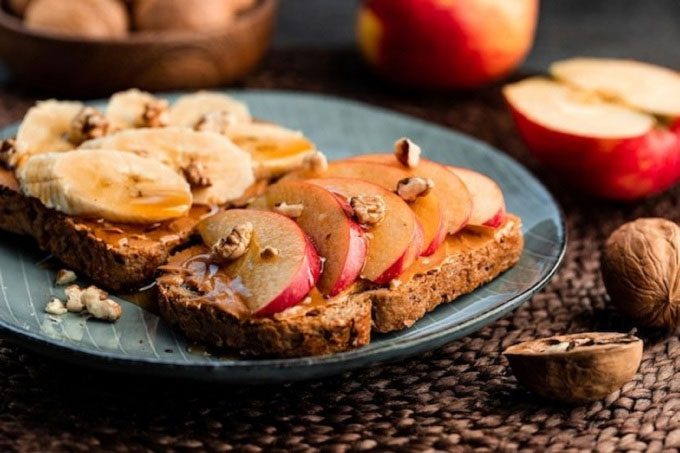The BRAT diet consists of low-protein, low-fat, and low-fiber foods that are easy to digest, helping to alleviate symptoms of diarrhea, nausea, and vomiting…
The BRAT Diet can treat diarrhea, stomach flu, and other gastrointestinal illnesses. The term “BRAT” is an acronym for the types of foods included in this diet: Banana, Rice, Apples, and Toast. These foods help reduce symptoms of stomach issues such as nausea and vomiting, abdominal pain, and diarrhea; they promote quick recovery after gastrointestinal illness.
Specifically, starchy foods that are low in fiber (rice, toast) can help bind loose stools, reducing diarrhea. Notably, bananas contain pectin, a type of soluble fiber that is beneficial for digestion. BRAT foods are very low in fat and protein, which minimizes the risk of irritating the stomach and putting stress on the digestive system. Due to their bland taste and lack of strong odors, BRAT foods are also less likely to cause nausea or vomiting.
Following the BRAT diet for a short period is unlikely to cause harm, but individuals should avoid long-term adherence, as this diet does not provide sufficient nutrients and is low in energy for extended use. Once diarrhea or gastrointestinal symptoms improve, it is important to return to a normal diet to prevent nutritional deficiencies that could lead to other health issues.
The BRAT diet lacks essential and important nutrients for the body, including protein, fats, fiber, vitamins (A, B12), and minerals (calcium). Therefore, this diet is not recommended for children experiencing diarrhea. Adhering to the BRAT diet can lead to malnutrition in children.

Apples, bananas, or toast in the BRAT diet are beneficial for digestion. (Photo: Freepik).
Those who wish to follow the BRAT diet for an extended period to manage stomach issues can incorporate other bland foods to enhance nutrition. Additional foods that can be included are: plain crackers, broth, potatoes, sweet potatoes, skinless chicken, porridge, oatmeal, and watermelon. When preparing these foods, it is advisable to bake, boil, or steam them to avoid frying or adding oils that could irritate the stomach.
Probiotics containing beneficial bacteria can shorten the duration of diarrhea. In addition to the aforementioned foods, individuals can include probiotic-rich foods in their diet, such as yogurt and pickled vegetables. For beverages, options like apple juice, herbal teas (ginger, peppermint), coconut water; or rehydration products and electrolytes if experiencing significant diarrhea and vomiting can be added to the BRAT diet. Patients should avoid sugary drinks as they can exacerbate symptoms.
When returning to a normal diet, individuals recovering from diarrhea (gastrointestinal illness) should avoid certain foods that are likely to cause digestive difficulty, nausea, vomiting, or loose stools, which could trigger a recurrence of symptoms. Foods to avoid include: dairy products (milk, cream, cheese… except yogurt), sugary foods (pastries, candies, sodas, chocolate…), high-fat foods, fried foods, and spicy foods.
It is also important to avoid alcohol, coffee, and carbonated beverages as they act as diuretics, potentially leading to dehydration and stomach irritation. Certain vegetables like broccoli, cauliflower, and beans may cause bloating and gas. Heavy proteins like beef, pork, and salmon are hard to digest and can further stress the stomach. Individuals with gastrointestinal issues should avoid these foods until they have fully recovered.
If following the BRAT diet does not alleviate diarrhea or if there are severe and unusual symptoms, individuals should seek medical attention. Severe signs include diarrhea lasting longer than two days, frequent recurrence of loose stools that worsen, accompanied by fever or blood in the stool. Diarrhea with symptoms of dehydration such as decreased urination, dry mouth, excessive thirst; feelings of dizziness, lightheadedness, or weakness require immediate hospital treatment. Parents should take children to see a doctor if they experience vomiting or diarrhea for more than a day, do not produce tears, have sunken cheeks, or exhibit any of the above symptoms.

















































